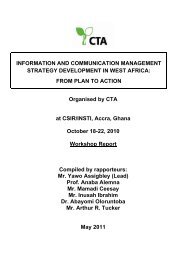Download Workshop Report [PDF] - ICM strategy development - CTA
Download Workshop Report [PDF] - ICM strategy development - CTA
Download Workshop Report [PDF] - ICM strategy development - CTA
You also want an ePaper? Increase the reach of your titles
YUMPU automatically turns print PDFs into web optimized ePapers that Google loves.
Executive Summary<br />
The Planning and Strategic Services Department within the Technical Centre for Agricultural and<br />
Rural Cooperation (<strong>CTA</strong>) has been conducting needs assessment studies, workshops and<br />
priority-setting activities across the Africa, Caribbean and Pacific regions involving hundreds of<br />
senior policy makers, planners and decision-makers from a wide cross-section of agricultural and<br />
rural <strong>development</strong> institutions. These activities have revealed deficiencies in the area of<br />
information sharing and dissemination at the planning level within institutions, which makes it<br />
difficult for institutions to effectively monitor, evaluate and learn lessons for the future. The lack of<br />
proper Information and Communication Management (<strong>ICM</strong>) policies and plans is a fundamental<br />
concern and is viewed as one of the main reasons for the lack of appropriate human and other<br />
resources, and the poor formulation and implementation of <strong>ICM</strong> activities.<br />
The <strong>ICM</strong> workshop in Namibia built on these past experiences and drew upon lessons learned<br />
from similar workshops held in the Caribbean and the Pacific. The main purpose of the workshop<br />
was to explore ways to increase the level of collaboration and sharing of information among<br />
organisations in southern Africa, as well as equipping them with the tools to develop an<br />
information policy. The specific objectives were to: (1) sensitise decision-makers on the value<br />
and importance of effective and efficient <strong>ICM</strong> (2) equip participants with the tools to develop <strong>ICM</strong><br />
policies and strategies in such a way that they are willing and able to develop policies and plans<br />
within their respective institutions and in partnership with other organisations; and (3) broaden<br />
the net of stakeholders, as well as increase awareness and collaboration among stakeholders of<br />
opportunities for sharing and exchanging information and data. The participants comprised policy<br />
and decision-makers from the agriculture and natural resources sector in the southern African<br />
region, and were drawn from <strong>CTA</strong>’s national and regional partner institutions, those institutions<br />
that participated in the needs assessments and priority-setting exercises, and institutions that<br />
have subsequently been identified as playing a key role in agriculture and rural <strong>development</strong> in<br />
the concerned regions.<br />
The five day workshop was held at Hotel Safari in Windhoek, Namibia. The opening and<br />
welcome addresses by <strong>CTA</strong> highlighted that this form of gathering should be seen as an<br />
“executive <strong>development</strong> programme”, and that the <strong>ICM</strong> is often thought of as the “forgotten<br />
budget line”. This was to highlight the importance, and yet the unrecognised role of <strong>ICM</strong> in<br />
organisations. This set the tone for the workshop in which a number of issues were covered,<br />
ranging from the planning tools used, information audits and information access, information<br />
dissemination, organisation and management, monitoring and evaluation, the <strong>ICM</strong> <strong>development</strong><br />
process and presentation of draft <strong>ICM</strong> strategies. The workshop was hands on, combining<br />
presentations from the main resource persons and participants tasks in which participants were<br />
expected to discuss and report in plenary. Ten practical issues/exercises that contributed<br />
towards the <strong>development</strong> of an <strong>ICM</strong> <strong>strategy</strong> were covered by the participants. These ranged<br />
from the initial identification of stakeholders, information audits, organisation and management<br />
options to alliances, bargains and compromises in the <strong>development</strong> of an <strong>ICM</strong> <strong>strategy</strong>. The<br />
closure of the workshop saw participants leaving with a draft outline of an <strong>ICM</strong> <strong>strategy</strong><br />
<strong>development</strong> for their organisations. Further <strong>development</strong> of the <strong>ICM</strong> <strong>strategy</strong> and the political<br />
buy-in to produce the <strong>strategy</strong> document is now the responsibility of the participants. It was,<br />
however, noted that the <strong>CTA</strong> is willing and can facilitate help for those institutions that want to<br />
develop their own <strong>ICM</strong> strategies.<br />
3 | P age


![Download Workshop Report [PDF] - ICM strategy development - CTA](https://img.yumpu.com/5365638/3/500x640/download-workshop-report-pdf-icm-strategy-development-cta.jpg)
